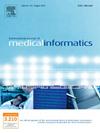Evaluating AI-generated patient education materials for spinal surgeries: Comparative analysis of readability and DISCERN quality across ChatGPT and deepseek models
IF 3.7
2区 医学
Q2 COMPUTER SCIENCE, INFORMATION SYSTEMS
International Journal of Medical Informatics
Pub Date : 2025-03-13
DOI:10.1016/j.ijmedinf.2025.105871
引用次数: 0
Abstract
Background
Access to patient-centered health information is essential for informed decision-making. However, online medical resources vary in quality and often fail to accommodate differing degrees of health literacy. This issue is particularly evident in surgical contexts, where complex terminology obstructs patient comprehension. With the increasing reliance on AI models for supplementary medical information, the reliability and readability of AI-generated content require thorough evaluation.
Objective
This study aimed to evaluate four natural language processing models—ChatGPT-4o, ChatGPT-o3 mini, DeepSeek-V3, and DeepSeek-R1—in generating patient education materials for three common spinal surgeries: lumbar discectomy, spinal fusion, and decompressive laminectomy. Information quality was evaluated using the DISCERN score, and readability was assessed through Flesch-Kincaid indices.
Results
DeepSeek-R1 produced the most readable responses, with Flesch-Kincaid Grade Level (FKGL) scores ranging from 7.2 to 9.0, succeeded by ChatGPT-4o. In contrast, ChatGPT-o3 exhibited the lowest readability (FKGL > 10.4). The DISCERN scores for all AI models were below 60, classifying the information quality as “fair,” primarily due to insufficient cited references.
Conclusion
All models achieved merely a “fair” quality rating, underscoring the necessity for improvements in citation practices, and personalization. Nonetheless, DeepSeek-R1 and ChatGPT-4o generated more readable surgical information than ChatGPT-o3. Given that enhanced readability can improve patient engagement, reduce anxiety, and contribute to better surgical outcomes, these two models should be prioritized for assisting patients in the clinical.
Limitation & Future direction
This study is limited by the rapid evolution of AI models, its exclusive focus on spinal surgery education, and the absence of real-world patient feedback, which may affect the generalizability and long-term applicability of the findings. Future research ought to explore interactive, multimodal approaches and incorporate patient feedback to ensure that AI-generated health information is accurate, accessible, and facilitates informed healthcare decisions.
评估人工智能生成的脊柱手术患者教育材料:ChatGPT和deepseek模型的可读性和DISCERN质量的比较分析
获取以患者为中心的健康信息对于知情决策至关重要。然而,在线医疗资源质量参差不齐,往往不能适应不同程度的卫生知识。这个问题在外科环境中尤其明显,复杂的术语阻碍了患者的理解。随着人们越来越依赖人工智能模型来补充医疗信息,人工智能生成内容的可靠性和可读性需要进行全面评估。本研究旨在评估四种自然语言处理模型——chatgpt - 40、ChatGPT-o3 mini、DeepSeek-V3和deepseek - r1——在为三种常见脊柱手术(腰椎间盘切除术、脊柱融合术和减压椎板切除术)生成患者教育材料中的作用。信息质量采用DISCERN评分进行评价,可读性采用Flesch-Kincaid指数进行评价。结果:deepseek - r1产生了最具可读性的反应,其flesch - kinkaid Grade Level (FKGL)得分在7.2到9.0之间,其次是chatgpt - 40。相比之下,chatgpt - 03的可读性最低(FKGL >;10.4)。所有人工智能模型的DISCERN分数都低于60分,将信息质量归类为“公平”,主要是由于引用的参考文献不足。结论:所有模型仅获得了“公平”的质量评级,强调了在引用实践和个性化方面改进的必要性。尽管如此,DeepSeek-R1和chatgpt - 40生成的手术信息比chatgpt - 03更具可读性。鉴于增强的可读性可以提高患者的参与度,减少焦虑,并有助于更好的手术结果,这两种模型应优先用于临床辅助患者。限制,未来方向本研究受限于AI模型的快速发展,其只关注脊柱外科教育,以及缺乏现实世界患者的反馈,这可能会影响研究结果的普遍性和长期适用性。未来的研究应该探索互动、多模式的方法,并纳入患者反馈,以确保人工智能生成的健康信息准确、可访问,并促进明智的医疗保健决策。
本文章由计算机程序翻译,如有差异,请以英文原文为准。
求助全文
约1分钟内获得全文
求助全文
来源期刊

International Journal of Medical Informatics
医学-计算机:信息系统
CiteScore
8.90
自引率
4.10%
发文量
217
审稿时长
42 days
期刊介绍:
International Journal of Medical Informatics provides an international medium for dissemination of original results and interpretative reviews concerning the field of medical informatics. The Journal emphasizes the evaluation of systems in healthcare settings.
The scope of journal covers:
Information systems, including national or international registration systems, hospital information systems, departmental and/or physician''s office systems, document handling systems, electronic medical record systems, standardization, systems integration etc.;
Computer-aided medical decision support systems using heuristic, algorithmic and/or statistical methods as exemplified in decision theory, protocol development, artificial intelligence, etc.
Educational computer based programs pertaining to medical informatics or medicine in general;
Organizational, economic, social, clinical impact, ethical and cost-benefit aspects of IT applications in health care.
 求助内容:
求助内容: 应助结果提醒方式:
应助结果提醒方式:


